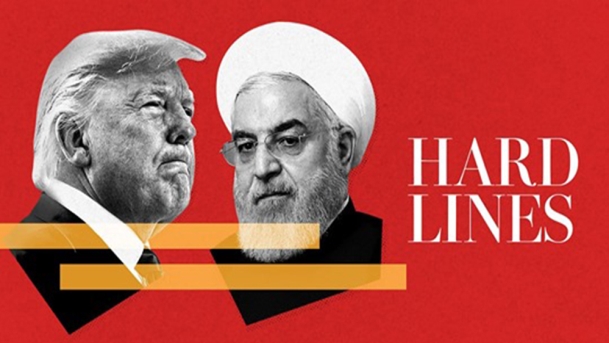
The In the midst of the political row in Washington about Trump’s sudden decision to fire John Bolton from his post as National Security Advisor, Secretary of State Mike Pompeo made a hint that President Donald Trump could meet with Iranian President Hassan Rouhani at the upcoming United Nations General Assembly, with "no preconditions." Pompeo made this comment during a press briefing to announce a raft of new sanctions on groups including a unit in Iran's Islamic Revolutionary Guards, hours after Trump announced the resignation of Bolton. (1)
This kind of statements tend to solidify the White House’s dual approach towards Iran: incremental sanctions and the calls for coming to the negotiating table. However, the departure of Bolton from Trump’s team may imply a downturn in the hawkish tone of the White House toward Tehran. Bolton was known for his unapologetic, hawkish view of the world, and for managing to be in the headlines even when he has said nothing in public. (2) He once wrote in an op-ed piece in the New York Times in 2015 entitled, "To Stop Iran's Bomb, Bomb Iran.”
In Tehran, Hesamuddin Ashena senior adviser to President Rouhani described Bolton’s resignation a "clear sign that the US maximum pressure strategy has failed." He also asserted "The fact that John Bolton was sidelined and then eliminated isn't an accident," and predicted "Iran's siege will break." A no-Bolton Trump administration will continue to resist the hawkish escalatory tone toward Tehran. The US policy. Bolton’s resignation should not indicate a 180-degree shift in Trump’s position since he canceled his plan to bomb three sites in Iran ten minutes before US airmen could have hit the red button.
In this paper, Iranian analyst Ali Akbar Dareini contextualizes the current standoff between Washington and Tehran in line with Trump’s pursuit of a comprehensive “maximum pressure” campaign and his Offensive Realism inspired foreign policy. He also examines what he considers Europe’s inaction and how it failed to fulfil its own obligations over fears of U.S. sanctions.
Introduction
As presidential candidate in 2016, Donald Trump repeatedly denounced the landmark nuclear deal with Iran, known as the Joint Comprehensive Plan of Action (JCPOA), as “stupid,” a “lopsided disgrace” and the “worst deal ever negotiated,” vowing to kill the agreement if elected. (3) “My number one priority is to dismantle the disastrous deal with Iran,” he promised the American Israel Public Affairs Committee (AIPAC), the most powerful pro-Israel lobbying organization in America, on March 21, 2016. (4)
Having taken office on 20 January 2017, an insurgent Trump in the White House began to rewrite America’s domestic and foreign policy. His promise to put “America First” crystallized that a new populist, protectionist America was emerging on the global stage.
Unlike former Democratic president Barack Obama, who was an internationalist and promoted multilateralism, Republican Trump is a nationalist who has opted for unilateralism. Fulfilling his election campaign promises, the Trump administration unilaterally pulled out of the JCPOA on May 8, 2018 with the goal of re-negotiating a new deal that would roll back Iran’s missile program and its influence in the Middle East. Simultaneously, it pursued a policy of “maximum pressure” and imposed draconian economic sanctions against the Islamic Republic to force Tehran to accept its excessive demands.
Washington’s exit from the 2015 JCPOA, against the advice of the international community and its European allies, put the future of the agreement in serious doubt. The historic nuclear deal, agreed between Iran and six world powers, was the toughest non-proliferation agreement negotiated ever prompting former U.S. Secretary of State John Kerry to admit that it “made the world a safer place”. The deal had lifted crippling international sanctions against Iran in return for decade-long curbs on the country’s nuclear program. Despite vowing to preserve the JCPOA, Europe has, so far, been unable to keep its side of the deal. It has stopped buying Iranian crude oil and engaging in banking transactions with Tehran fearing U.S. sanctions.
Europe’s inability to live up to its obligations under the JCPOA prompted Iran in May 2019, after a year of strategic patience, to start reducing its commitments since it no longer benefited from complying with the deal. The moderate administration of President Hassan Rouhani has adopted a multipronged strategy to counter Trump’s “maximum pressure” campaign: Pursuing an active foreign diplomacy to protect its interests; pivoting to Asia and expanding trade exchanges with its neighbors; and developing refineries with the goal of increasing exports of added-value products and stop export of crude oil in the long term under a strategy called “resistance economy.”
Trump’s Goals
The JCPOA was the outcome of over 12 years of tough negotiations, reached in July 2015 between Iran and the P5+1 group _ permanent members of the U.N. Security Council (United States, Britain, France, Russia and China) along with Germany. The deal was globally recognized as the toughest non-proliferation agreement ever negotiated and widely seen as Obama’s greatest foreign policy achievement. The accord boosted Iran’s global image and its regional standing, prompting Republicans in the U.S., Israel and Saudi Arabia to seek to undermine it. The lifting or easing of sanctions paved the way for Iran’s economic growth as foreign investors rushed to the country.
Trump did not like it because JCPOA freed Iran from the chain of sanctions and enabled the Islamic Republic to assert itself even more than before. He argued that the JCPOA dealt with a small slice of Iran’s activities that Washington found alarming, not the full range of U.S. concerns. But, the fact was that the deal had been intended from day one to address Iran’s nuclear program only, not more, because addressing all U.S. and Iranian concerns would have resulted in many years of stalled talks without agreement.
In the words of Trump, the deal “lifted crippling economic sanctions on Iran in exchange for very weak limits on the regime’s nuclear activity, and no limits at all on its other malign behavior, including its sinister activities in Syria, Yemen, and other places all around the world … it also fails to address the regime’s development of ballistic missiles.”(5) Finally, Trump unilaterally withdrew from the Obama-era deal to re-negotiate an agreement that would eliminate Iran’s uranium enrichment industry, roll back its missile program, and contain its regional influence without addressing Iranian concerns.
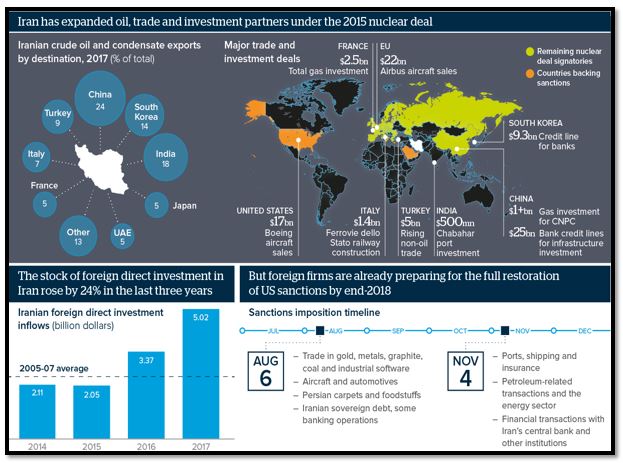 |
| Iran Energy [Oxford Analytica] |
To achieve its goal, the Trump administration imposed severe economic sanctions on the Islamic Republic and vowed to bring Iran’s oil revenues to zero. Use of harsh economic sanctions by Washington as a political weapon was aimed at depriving Iran of its main source of foreign currency revenue and compelling Tehran to surrender. Trump’s spite against Obama and his dedication to dismantle Obama-era laws and policies was another key motivation behind Trump’s exit from the JCPOA.
Former British ambassador to the U.S., Kim Darroch, revealed that Trump discarded the JCPOA for "personality reasons," as the deal had been agreed to by Obama. He also said the White House failed to produce a "day-after" plan on how to handle the aftermath of withdrawing from the deal. (6)
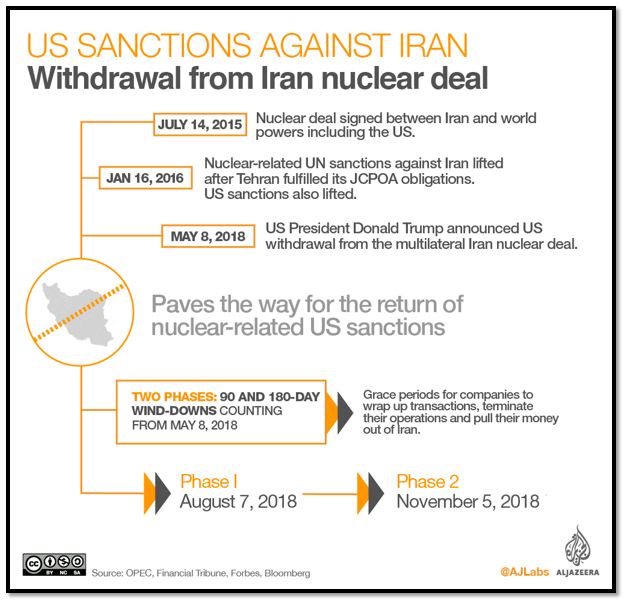 |
| Iran US Sanctions [Aljazeera] |
Trump’s Offensive Realism
Undermining the JCPOA remains at the heart of Trump administration’s unilateralism and economic protectionism. Its directions can be understood as an “offensive realist” foreign policy that is guided by his worldview. And undoubtedly, Trump’s foreign policy has thrust the liberal internationalist order into disarray. “Offensive Realism”, a subcategory of neorealist school of thought, postulates an anarchic international system in which all states possess offensive military capability; states can never be certain of the intentions of other states; and all states work to increase and maximize their power as survival is their primary goal. American political scientist John Mearsheimer argues that, in offensive realism, the anarchic nature of the international system provides great powers with a strong incentive to resort to offensive action and aggressive behavior in order to increase their security and dominate the world. (7)
Trump considers international relations as a zero-sum game. He favors bilateral, rather than multilateral, trade relations because the U.S. possesses military and economic superiority to win in each bilateral agreement. That’s why he pulls out of multilateral agreements, opposes integration and shuns alliances. He believes multilateralism and liberal international trade system has turned the U.S. into a profitable market for foreign products and thus made America weak under Obama. So, unilateralism and trade protectionism is the way to “Make America Great Again.” (8)
That explains why he has pulled America out of global accords such as the JCPOA, Paris Climate Agreement, Intermediate-Range Nuclear Forces Treaty, United Nations Educational, Scientific and Cultural Organization (UNESCO) and even has threatened to withdraw from the World Trade Organization (WTO).
The Trump administration’s trade war with China, its tariffs on imports, and its diatribes against NATO allies over defense spending are evidence that the White House wants a bigger profit in everything and this policy of making others pay more applies to both friends and foes. It argues that both American allies and adversaries have been taking advantage of the U.S. and now things must change in America’s favor. Trump imposes tariffs on imports to make production in America profitable. This is justified under neo-mercantilist policies that encourage exports, discourage imports and seek to increase the level of U.S. foreign reserves. In his first “State of the Union Address” at the joint session of Congress in 2017, Trump clarified his position: “My job is not to represent the world. My job is to represent the United States of America.” (9)
Europe’s Inaction
Europe has denounced Trump’s violation of the JCPOA as well as his steady efforts to weaken the rule of international law and global institutions including the United Nations. With the exception of Trump’s America, Israel and Saudi Arabia, the rest of the world have been keen on maintaining the JCPOA since it belongs to the entire international community.
EU foreign policy chief Federica Mogherini rebuked Trump the same day the U.S. pulled out of the JCPOA (May 8, 2018), saying “the nuclear deal is not a bilateral agreement and it is not in the hands of any single country to terminate it unilaterally.” The JCPOA, she clarified “has been unanimously endorsed by U.N. Security Council Resolution 2231. It’s a key element of the global nuclear non-proliferation architecture … The EU will remain committed to the continued full and effective implementation of the nuclear deal. The lifting of nuclear-related sanctions is an essential part of the agreement.” (10)
While Europe sympathized with Iran and maintained that the JCPOA has been delivering on its goal, it failed to fulfil its own obligations over fears of U.S. sanctions. In January 2019, it registered the Instrument in Support of Trade Exchanges (INSTEX) as a European special purpose vehicle to protect legitimate trade with Iran and facilitate non-dollar transactions but it is not yet functioning.
Iranians found it disappointing and even insulting after EU officials indicated that INSTEX would cover, at least at the beginning, humanitarian goods such as medicine and agricultural products. Those items were not sanctioned although, due to lack of banking transactions, they could hardly reach Iran. INSTEX was designed to allow European companies doing business with Iran to bypass U.S. sanctions and shield them from U.S. punishments. Under Article 26 of JCPOA, the EU is required to normalize business relations with Iran and “refrain from re-introducing or re-imposing the sanctions that it has terminated implementing under this JCPOA”. (11)
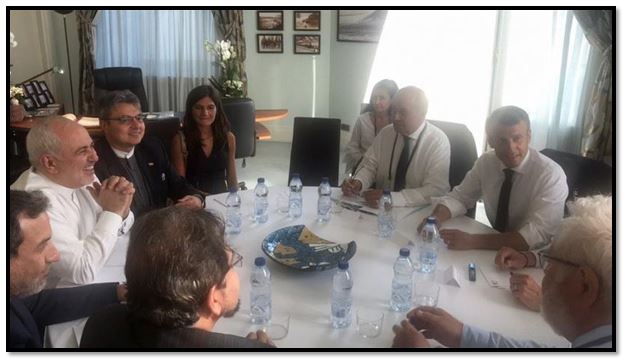 |
| Zarif Macron on the sideline of the G7 Summit in France [Aljazeera] |
In addition to re-imposing unilateral sanctions against the Islamic Republic and banning American companies from any transactions with Iran, the U.S. has vowed to punish any non-U.S. companies that invest in or continue to do business with Iran. “Anyone doing business with Iran will not be doing business with the United States,” Trump tweeted August 7, 2018. (12)
Prior to U.S. sanctions, the 28-member EU purchased over half a million barrels of crude oil from Iran. Now, it’s zero. Only Russia and China remain somehow committed to their obligations.
Mogherini dashed Iranian hopes when she clarified August 30, more than 15 months after the U.S. exit, that operationalization of INSTEX “takes time, a lot of time.” (13)
Reducing Commitments
The International Atomic Energy Agency (IAEA), the U.N. nuclear watchdog, has confirmed in 15 consecutive quarterly reports, until recently, that Iran has fully abided by the terms of the JCPOA.
Iran has made it clear that it will preserve the deal if it continues to reap its economic benefits, basically meaning that Tehran will remain committed to the terms of the JCPOA - despite U.S. exit - if it’s able to sell its oil and get the money back or buy products.
With Europe failing to stick to the deal in practical terms, Iran had no option but to change course. Having waited for Europe to keep its part of the deal for a year without any tangible results, Tehran began to reduce its commitments on May 8, 2019, on the first anniversary of U.S. exit.
Iran no longer considered itself committed to the limits agreed on its stocks of low enriched uranium - 300 kilograms - and heavy water - 130 tons - under the JCPOA. After 60 days, it further scaled down its commitments in July by increasing the level of uranium enrichment from 3.6 to 4.5 percent. France has launched a diplomatic initiative to salvage the deal under which the EU would provide a $15 billion credit line to Iran (for the last quarter of 2019) to finance oil sales in return for Iran fully complying with the JCPOA. The U.S. has rejected the proposal.
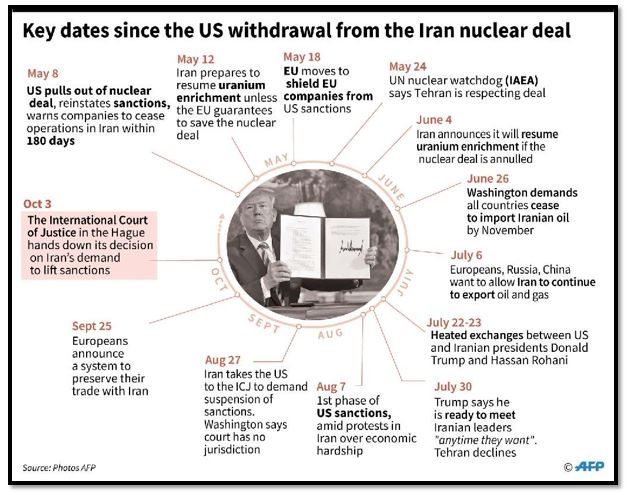 |
| US-Iran Key Dates [AFP] |
Iran took its third step on September 6, after another 60-day ultimatum to EU expired without a breakthrough, when it stopped complying with the deal’s limits on nuclear research and development. That means working on advanced centrifuges that enrich uranium faster. Iranian officials have vowed to fully resume compliance should Europe keep its part of the deal, arguing that Iran no longer benefited from honoring the JCPOA after the U.S. exited and imposed unprecedented economic sanctions. So, there is no point to unilaterally implement the deal while other parties have not abided by their obligations.
To justify its strategic decision, Iran cites Article 26 of the JCPOA under which Iran will treat re-imposition of sanctions “as grounds to cease performing its commitments under this JCPOA in whole or in part.” The small steps Iran has taken so far under its new policy of step-by-step reduction of its commitments have been carefully calibrated in order to avoid upsetting the whole thing. Under a cost and benefit calculation, the Rouhani administration has been careful not to let Europe fully join the Trump camp. Iran could have jumped to 20 percent level enrichment or higher in the first step but did not do so to allow more room to diplomacy to run its course and compel Europe to change its calculation.
Oil Tanker Trap
British authorities seized Panama-flagged oil supertanker Grace 1 July 4 in the waters off Gibraltar on the grounds that it was carrying Iranian crude oil to Syria in violation of EU embargo. Iran asserted that the cargo aboard the ship was not destined for Syria while it was not under any legal obligation to abide by EU sanctions since the ban could be applied only to EU states. Backdoor negotiations failed to get the ship released, forcing Iran to retaliate by impounding British oil tanker, Stena Impero, in the Strait of Hormuz July 19. However, Tehran kept the door of diplomacy open to de-escalate tensions and find a solution to the standoff.
There were clear indications that Iraq war architect John Bolton, Trump’s hardline former National Security Advisor, was involved in manufacturing the Gibraltar drama. He had tipped off Britain and was keen to put the UK on the path of confrontation with Iran. London, initially, fell in Bolton’s trap. Britain’s legal justification was weak and Iran’s retaliation was instrumental in getting Grace 1, later renamed Adrian Darya 1, released on 15 August despite U.S. efforts to prevent it from happening. Britain rejected U.S. request to keep the ship impounded since, in the words of journalist Gareth Porter, the Trump administration’s warrant “perfectly illustrates the U.S. trying to impose its domestic laws on the rest of the world.”(14)
The U.S. saw the tensions an opportunity to create a coalition to protect “free navigation” in the Strait of Hormuz. It called on more than 60 nations to join it but few countries, such as Britain and Australia, expressed readiness to be part of a U.S.-led military buildup in the Persian Gulf.
Even American allies, Germany, Japan and France, did not want to be seen aligned to a Trump administration that had pulled out of the JCPOA and sent signals for a possible disastrous military confrontation with Iran.
Rouhani has sought to prolong the longevity of the deal provided that the remaining parties deliver on their promises. He has also kept the path of dialogue with the Trump administration open should it return to the JCPOA and lift the sanctions. “The moment you stop sanctions and bullying, we are ready to negotiate,” he said July 14, 2019. (15)
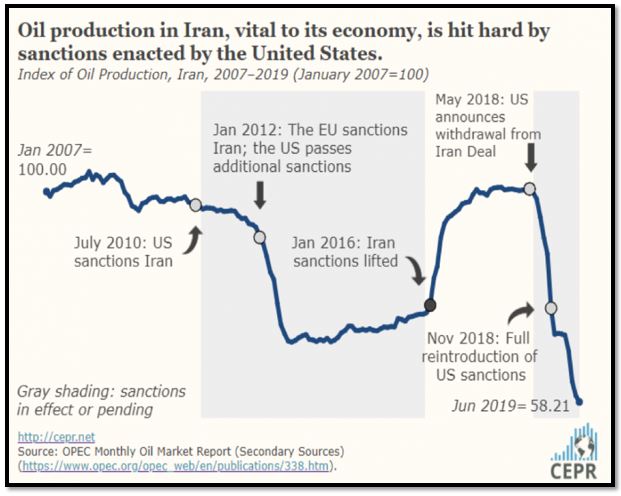 |
| Iran's oil production [CEPR] |
“Maximum Pressure” Campaign
Having pulled out of the JCPOA, the Trump administration has vigorously pursued a comprehensive “maximum pressure” campaign to undermine Iran and depict its ruling system incapable and incompetent to rule. Washington’s goal of bringing Iran’s oil exports to zero and cutting it from the global banking network has been intended to make Iran economically bankrupt and provoke Iranians to rise up, hoping that an ailing economy combined with domestic challenges will force the ruling system to surrender.
A series of streets protests in various Iranian cities, a sharp hike in prices, and an unprecedented devaluation of rial, Iran’s national currency, in early 2018 encouraged the White House to pursue the policy forcefully. The “maximum pressure” campaign is based on the assumption that every economy has a breaking point and the Islamic Republic will finally back down under the massive load of sanctions and will agree to Trump’s terms.
Although draconian sanctions have led to a sharp drop in Iran’s crude oil exports and done damage to Iran’s economy, the Trump administration has not achieved any of its declared goals.
The JCPOA has not been re-negotiated, an ideal deal that Trump had aspired has not been achieved, Iran’s uranium enrichment program has not been dismantled, its missile program has not been curtailed, and its regional influence has not been reduced, let alone ended.
The Trump administration has ignored or underestimated the important factor of national pride in Iran and the Shiite Muslim doctrine of not surrendering to coercion. This was admitted by Kerry who told a hearing of the Senate Foreign Relations Committee July 23, 2015 that “sanctions did not stop Iran's nuclear program from growing steadily” but Washington’s call for dialogue and respect. “Iran's complete capitulation. That's a fantasy, plain and simple, and our own intelligence community will tell you that,” he said. (16) The JCPOA was achieved only after the U.S. chose the path of respect and talks.
Although public discontent has not disappeared in Iran, street protests have ended, rial has stabilized and the economy is “showing signs of improvement in major variables” as claimed by Central Bank of Iran Governor Abdolnasser Hemmati. (17)
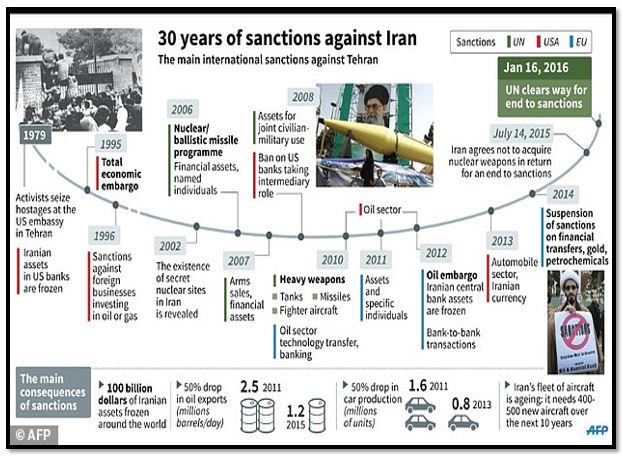 |
| Iran's Thirty Years of Sanctions [AFP] |
Designating the Revolutionary Guard, an official unit of Iran’s military, as a foreign terrorist organization, which subsequently led to Iran labeling the U.S. Central Command (CENTCOM) a terrorist group, was a major first on the international stage that strengthened the suspicion in Tehran that Trump is after regime change, not dialogue.
By placing Iran’s Supreme Leader Ayatollah Ali Khamenei and Foreign Minister Mohammad Javad Zarif under sanctions, the U.S. has effectively shut the door to negotiations since Zarif would be the one doing it, if any. Imposing sanctions on Iran’s top diplomat was seen as closing the door to diplomacy.
Iranians of different persuasions tend to agree that, by imposing the toughest sanctions, Trump has already thrown much of his leverage against Iran away and has little left to do. So, resistance, not giving in to “economic terrorism”, in the words of Zarif, is the way forward.
Iran’s Options
In the face of brutal sanctions, the Rouhani administration has adopted a multi-pronged strategy to nullify U.S. pressures and improve Iran’s economy. One key element of this strategy has been to pursue an active foreign policy exposing Trump’s unilateralism as wrecker of the JCPOA and disregard for international law. Zarif’s tweeter diplomacy symbolizes Iran’s use of soft power to reveal the dangerous agenda of “B Team” (Bolton, Israeli Prime Minister Benjamin Netanyahu, Saudi Crown Prince Mohammad bin Salman, and Abu Dhabi Crown Prince Mohammed bin Zayed) in pushing the United States towards a catastrophic conflict with Tehran.
Simultaneously, Iran has pursued constructive engagement with the outside world and working to get Europe keep its part of the deal and not let it fall into Trump’s arms. Another key element of this multi-faceted strategy has been to make Iran self-sufficient in gasoline production. Under Rouhani, Iran’s gasoline production has doubled in six years from around 50 million liters to over 100 million liters per day. That has resulted in an end to refined fuel imports.
The inauguration by Rouhani of phase 3 of the $3.4 billion Persian Gulf Star Refinery near Bandar Abbas in February 2019 was a demonstration of his government’s will to turn Iran into an exporter of fuel. Iran will have little problem to sell added value gasoline instead of crude oil. “We are producing 15 million liters of gasoline more than the country’s consumption demand, which we save. We have also started exporting it,” Oil Minister Bijan Namdar Zanganeh told reporters July 30. (18) By building more refineries and turning itself into a gasoline exporter, Iran has to end crude oil exports in the long term, with or without sanctions.
A third element of the strategy has been to develop a new business system. Vice President for Science and Technology Sorena Sattari leads government policy to encourage establishment of private startup firms as part of a strategy to reduce reliance on oil revenues. Pardis Technology Park (PTP), an area covering 60 hectares of land outside Tehran, was created to set up knowledge-based businesses. PTP, the biggest startup campus in Western Asia, has now turned into Iran’s “Silicon Valley”. The goal is to change Iran’s oil-based economy into a knowledge-based system. According to Sattari, 4,500 startup companies are operating in Iran now, employing 350,000 people, and earned 90,000 billion rials ($782 million) in 2018. (19)
Iran has also enhanced food production in recent years and is now 82 percent self-sufficient. (20)
“Pivot to Asia” is another strategic option Iran has pursued under Rouhani. Pivoting toward Asia is part of Iran’s distinct “rebalancing” toward the East. The reorientation has been driven in part by the pains Iran has suffered from Trump’s “maximum pressure” campaign and partly due to the bitter history of Iran’s relations with the West in contemporary history in general. Asia has now emerged as a key economic lifeline for Iran with China being at the center. Simultaneously, Iran has adopted a policy of strengthening ties with five emerging economies: Brazil, Russia, India, China and South Africa (BRICS), seeking partners beyond its immediate periphery.
At the home front, the government has followed “resistance economy” as a way to circumvent sanctions or minimize its impact. A concept developed by Khamenei, “resistance economy” seeks to expand non-oil exports, increase domestic production of strategic goods, and develop markets in neighboring countries. The strategy also encourages increased export of electricity, gas, petrochemical and oil by-products, instead of crude oil, since it will be much harder to impose sanctions on oil by-products.
That’s why Iran is already moving towards creating new Free Trade Zones (FTZs) along its borders to promote trade with neighboring states as a response to sanctions. The Iranian Parliament has already approved a bill to establish 8 new FTZs to bring Iran’s total number of FTZs to 16.
Furthermore, the ruling system is struggling to fight corruption and mismanagement as they have harmed Iran even more than sanctions.
Conclusion
Trump administration’s unilateral withdrawal from the JCPOA has positioned it as the irresponsible party wrecking a multilateral global deal that has been delivering. It has discredited the United States as a trustworthy negotiating partner and has pushed the world towards greater chaos. The decision was aimed at preventing Iran’s economic progress and was based on Trump’s rejection of multilateral international pacts and his dedication to destroy Obama’s foreign policy achievements. The White House maintains that sanctions will bring Iran to its knees, but if that doesn’t work, it has no plan B.
While the EU has rebuked Trump’s exit from the JCPOA, the bloc has stopped banking transactions and purchasing Iranian crude oil over fears that European companies doing business with Iran would be punished by Washington. EU’s failure to keep its side of the deal forced Iran, after a year of patience, to start scaling down its commitments to the JCPOA every 60 days in order to impose costs on the U.S. and pressure Europe to deliver on its obligations. Iran has clarified that it needs to be able to sell its oil and get the money if the deal is to be saved. “Commitment in response to commitment is a strategy that we have now adopted,” government spokesman Ali Rabiei told reporters September 2. (21)
Washington’s use of sanctions as a political weapon has done a lot of damage to Iran’s economy but has failed to achieve its declared goals of re-negotiating a new deal that would dismantle Iran’s enrichment infrastructure, limit its missile program, and stop its regional influence and allies.
The draconian sanctions have, instead, pushed Iran to create new FTZs along its borders to promote commercial exchanges with its 15 neighbors, construct refineries, increase production of oil by-products, and pursue “pivot to Asia” to minimize the impact of sanctions while implementing a policy of “resistance economy” _ a home-grown strategy that encourages production and exports, promotes self-sufficiency and calls for a knowledge-based economy to reduce dependence on oil revenues.
1. Helen Regan and Sharif Paget, “Pompeo hints that Trump could meet with Iranian President at UN meeting”, CNN September 11, 2019 https://edition.cnn.com/2019/09/11/middleeast/bolton-iran-trump-pompeo-rouhani-intl-hnk/index.html
2. Micheline Maynard, Donald Trump sacks John Bolton, moves Iran to backburner, but he has other foreign policy dramas”, ABC News, September 11 2019 https://www.abc.net.au/news/2019-09-11/bolton-sacking-cant-solve-trumps-foreign-policy-problems/11500846
3. Bradley Klapper, “Will Trump try to renegotiate the Iran deal?”, AP, November 11, 2016. Available at: https://www.pbs.org/newshour/world/iran-nuclear-deal-renegotiate
4. Times of Israel, “Trump: My No. 1 priority is to dismantle the disastrous deal with Iran”, March 21, 2016. Available at: https://www.timesofisrael.com/liveblog_entry/trump-my-no-1-priority-is-to-dismantle-the-disastrous-deal-with-iran/
5. Donald Trump, “Remarks by President Trump on the Joint Comprehensive Plan of Action” May 8, 2018. Available at: https://www.whitehouse.gov/briefings-statements/remarks-president-trump-joint-comprehensive-plan-action/
6. Caroline Kelly, Caroline, “Trump left Iran deal to spite Obama”, July 15, 2019. Available at: https://edition.cnn.com/2019/07/13/politics/daily-mail-trump-iran-nuclear-deal-leaked-cables/index.html
7. John Mearsheimer, “The Tragedy of Great Power Politics”, 21–31.
8. Carla Norrlof, “Hegemony and inequality: Trump and the liberal playbook”, International Affairs, 94(1), 63-88. Available at: https://www.chathamhouse.org/sites/default/files/images/ia/INTA94_1_5_262_Norrlof.pdf
9. Donald Trump, “Remarks by President Trump in Joint Address to Congress”, February 28, 2017. Available at: https://www.whitehouse.gov/briefings-statements/remarks-president-trump-joint-address-congress/
10. Federica Mogherini, “Remarks by HR/VP Mogherini on the statement by US President Trump regarding the Iran nuclear deal (JCPOA)”, May 8, 2018. Available at: https://eeas.europa.eu/headquarters/headquarters-homepage/44238/remarks-hrvp-mogherini-statement-us-president-trump-regarding-iran-nuclear-deal-jcpoa_en
11. Joint Comprehensive Plan of Action, July 14, 2015. Available at: http://www.europarl.europa.eu/cmsdata/122460/full-text-of-the-iran-nuclear-deal.pdf
12. Donald Trum, tweet, August 7, 2018. Available at: https://twitter.com/realdonaldtrump/status/1026762818773757955?lang=en
13. Federica Mogherini, “Remarks by HR/VP Federica Mogherini at the press conference following the informal meeting of EU Foreign Ministers”, August 30, 2019. Available at: https://eeas.europa.eu/headquarters/headquarters-homepage/66820/remarks-hrvp-federica-mogherini-press-conference-following-informal-meeting-eu-foreign_en
14. Jake Johnson, “Bolton Is Desperate to Start a War”, August 17, 2019. Available at: https://www.commondreams.org/news/2019/08/17/bolton-desperate-start-war-us-issues-warrant-seize-iranian-oil-tanker
15. AP, “Iran says ready to negotiate if US lifts sanctions”, July 14, 2019. Available at: https://www.apnews.com/29a2e3b173ab40ab96f88ed55a755193
16. John Kerry, “Secretary Kerry’s Remarks SFRC Hearing on the Iran Nuclear Deal”, July 23, 2015. Available at: https://www.foreign.senate.gov/download/secretary-kerry-iran-testimony
17. Financial Tribune, “Iran’s Economy Improving Gradually”, August 20, 2019. Available at: https://financialtribune.com/articles/business-and-markets/99505/irans-economy-improving-gradually
18. Tehran Times, “Iran’s daily gasoline output exceeds 100m liters”, August 13, 2019. Available at: https://www.tehrantimes.com/news/439210/Iran-s-daily-gasoline-output-exceeds-100m-liters
19. ISNA News Agency, July 27, 2019. Available at: https://www.isna.ir/news/98050502482
20. Tehran Times, “Iran 82% self-sufficient in producing foodstuff”, February 12, 2019. Available at: https://www.tehrantimes.com/news/432876/Iran-82-self-sufficient-in-producing-foodstuff
21. Tehran Times, “Iranian government: Nuclear commitment is reciprocal”, September 2, 2019. Available at: https://www.tehrantimes.com/news/439885/Iranian-government-Nuclear-commitment-is-reciprocal
